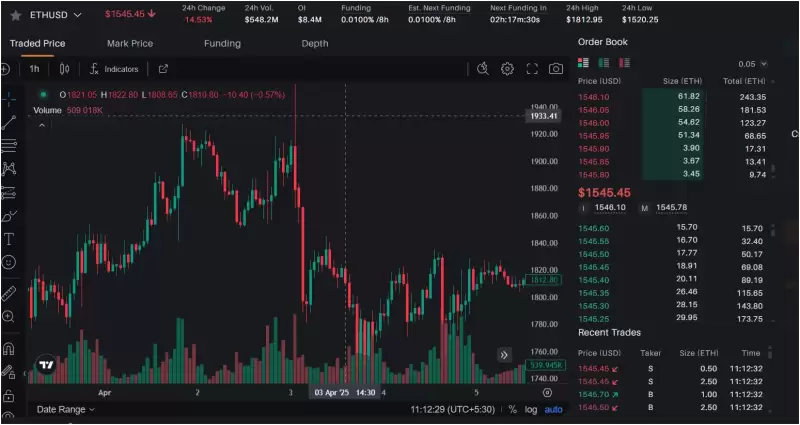 |
|
 |
|
 |
|
 |
|
 |
|
 |
|
 |
|
 |
|
 |
|
 |
|
 |
|
 |
|
 |
|
 |
|
 |
|
Cryptocurrency News Articles
US Treasury Ramps Up Crypto Sanctions on Russia-Linked Firms to Curb Evasion
Mar 27, 2024 at 11:00 am
The US Treasury's OFAC has sanctioned 13 entities and two individuals linked to Russia for allegedly facilitating transactions and providing crypto services to "evade sanctions." These companies, including Netex24 and Bitpapa, have facilitated significant transactions to sanctioned entities over the past two years, according to on-chain data from Chainalysis, with a significant portion of their transaction history involving exchanges without KYC controls and darknet markets.

U.S. Treasury Ramps Up Sanctions on Russia-Linked Crypto Companies Amid Evasion Concerns
In a move to counter the use of crypto-related services to evade sanctions, the U.S. Department of the Treasury's Office of Foreign Assets Control (OFAC) has designated a group of thirteen entities and two individuals for their alleged role in facilitating transactions and providing cryptocurrency services to sanctioned Russian parties.
Targeting Russia's Financial Infrastructure
The designated companies operate within Russia's key financial infrastructure, providing services in the "financial services and technology sectors of the Russian Federation economy." Additionally, Russia-based and Russia-linked individuals involved in developing and offering virtual asset services that enable sanctioned entities to bypass U.S. sanctions are also targeted.
Absolute Ban on Transactions
The designations prohibit any transactions or interactions between the designated entities and U.S. individuals or entities. This measure is part of OFAC's and the G7's concerted efforts to thwart the circumvention of sanctions and export control measures by designated parties.
Treasury's Rationale
Brian E. Nelson, Under Secretary of the Treasury for Terrorism and Financial Intelligence, outlined the Treasury's rationale for the sanctions: "Russia is increasingly turning to alternative payment mechanisms to circumvent U.S. sanctions and continue to fund its war against Ukraine. As the Kremlin seeks to leverage entities in the financial technology space, Treasury will continue to expose and disrupt the companies that seek to help sanctioned Russian financial institutions reconnect to the global financial system."
Role of Netex24 and Bitpapa in Sanctions Evasion
Blockchain research firm Chainalysis has released a report highlighting the role of two of the designated entities, Netex24 and Bitpapa, in facilitating sanctions evasion. Netex24, a Moscow-based fintech company operating a crypto exchange, and Bitpapa, a peer-to-peer (P2P) exchange, have enabled significant transactions to sanctioned entities over the past two years.
On-Chain Analysis Reveals Suspicious Activity
Chainalysis utilized on-chain data to identify "clusters associated with both services." The report emphasized the significant portion of the companies' transaction history involving exchanges lacking Know Your Customer (KYC) controls and darknet markets.
Massive Fund Outflows for Illegal Purposes
The designated entities have exhibited substantial fund outflows for potentially illegal purposes. Bitpapa has reportedly transferred 52% of its outflows to sanctioned entities and 32.6% to darknet markets from October 2019 to March 2024. Similarly, Netex24 has directed 46.7% of its outflows to darknet markets and 23.4% to sanctioned entities from October 2016 to March 2024.
Support for Pro-Russia Groups
Chainalysis also identified transactions facilitated by both companies to several pro-Russia militia and propaganda groups, including the OFAC-designated MOO Veche.
Intensified Efforts Against Crypto-Related Sanctions Evasion
The U.S. government has intensified its scrutiny of entities using crypto-related services to bypass sanctions. In January, sanctions were imposed on platforms facilitating crypto transactions linked to the terrorist group Hamas.
Concerns Raised by Crypto Community
The U.S. has also targeted crypto mixers, which provide anonymity for crypto transactions, due to their misuse by criminal actors. Notably, the bans imposed on Tornado Cash and its founder have raised concerns within the crypto community.
Conclusion
The Treasury's latest sanctions demonstrate the U.S. government's determination to combat the evasion of sanctions and export control measures through crypto-related services. Entities and individuals involved in facilitating such transactions face the risk of significant consequences, including the prohibition of transactions and interactions with U.S. parties. As the Ukraine conflict continues, the U.S. government is expected to continue its efforts to disrupt the use of cryptocurrencies for illicit purposes.
Disclaimer:info@kdj.com
The information provided is not trading advice. kdj.com does not assume any responsibility for any investments made based on the information provided in this article. Cryptocurrencies are highly volatile and it is highly recommended that you invest with caution after thorough research!
If you believe that the content used on this website infringes your copyright, please contact us immediately (info@kdj.com) and we will delete it promptly.
-

-

-

-

-

-

- Patients visiting the ear, nose, and throat (ENT) outpatient department (OPD) at Government Medical College and Hospital (GMCH), Sector 32, can now bid goodbye to long queues.
- Apr 17, 2025 at 03:45 pm
- On Wednesday, the hospital introduced a new queue management system in the ENT department located on the third floor of Block B, aiming to streamline patient flow and bring more transparency to the consultation process.
-

-

-




























































